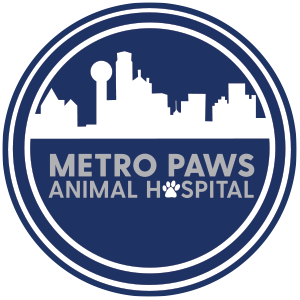By: Caitlin Spillers, DVM
What is parvovirus?
Parvovirus is a highly contagious virus that attacks the gastrointestinal system of dogs. It most commonly affects puppies, juveniles, and unvaccinated dogs.. The virus attacks the intestinal lining and causes sloughing of the intestines and can even be fatal. When a dog tests positive for parvovirus, they are said to have “parvo.”
What are symptoms of parvovirus?
The most common symptoms of parvo are diarrhea (often bloody), vomiting, severe dehydration, lethargy, and a decreased appetite. A fever is also commonly present as well as a painful abdomen.
How is parvovirus transmitted?
Parvovirus is a highly resistant virus that can survive for long periods of time in the environment. Parvo is transmitted from feces, dog-to-dog contact, and environmental contact via feces of an infected dog. Unfortunately, parvovirus is very common in Dallas, especially in areas with a high population of stray animals.
What do I do if I think my dog has parvo?
If you suspect your dog has parvovirus, it is critical that you seek veterinary care immediately as their symptoms can progress to life-threatening dehydration and widespread infection quickly! A rapid test can be performed that can determine if your pet has parvo in just 10 minutes!
How is parvo treated?
Unfortunately, since parvo is a virus, there is no definitive cure for the virus itself. It is, however, critical to aggressively treat the symptoms and make the body as strong as possible to fight the virus itself. Fluid therapy to correct dehydration, anti-nausea medications, appetite stimulants, correcting electrolyte abnormalities, and controlling the diarrhea are all mainstays of treatment! For parvo patients who become critically ill, plasma transfusions may be necessary. Most cases of parvovirus require multiple days of hospitalization, but outpatient therapy (sending medications and supportive care home) may be considered a viable option in some cases.
How can I prevent parvovirus?
Vaccination is the best protection against parvovirus. Puppies are not protected from a single vaccine! Puppies require multiple boosters of the parvo vaccine, the last being at at least 16 weeks of age to offer protection. Continuing boosters of this vaccine throughout the life of your pet is critical to help continue to avoid this disease. Unfortunately, as with every vaccine, it is still possible, although very rare, for a fully vaccinated dog to acquire parvovirus.
What is Metro Paws doing to help protect my pet?
Metro Paws Animal Hospital has protocols in place to help maintain a safe and clean environment for all of our patients. These protocols include decontamination of every exam room between each patient, not allowing juvenile animals in common areas, and wearing appropriate protective equipment when a patient is either a parvovirus suspect or is confirmed positive. Further, a team of Metro Paws doctors performed a retrospective study on outcomes of outpatient therapy in Parvovirus. This paper was published in the Journal of American Veterinary Medical Association (JAVMA) and can be found here.
